The Health Promotion Practice Journal has recognized one of our own - Applying Learning Theory to Safety and Health Training for Hispanic Immigrant Dairy
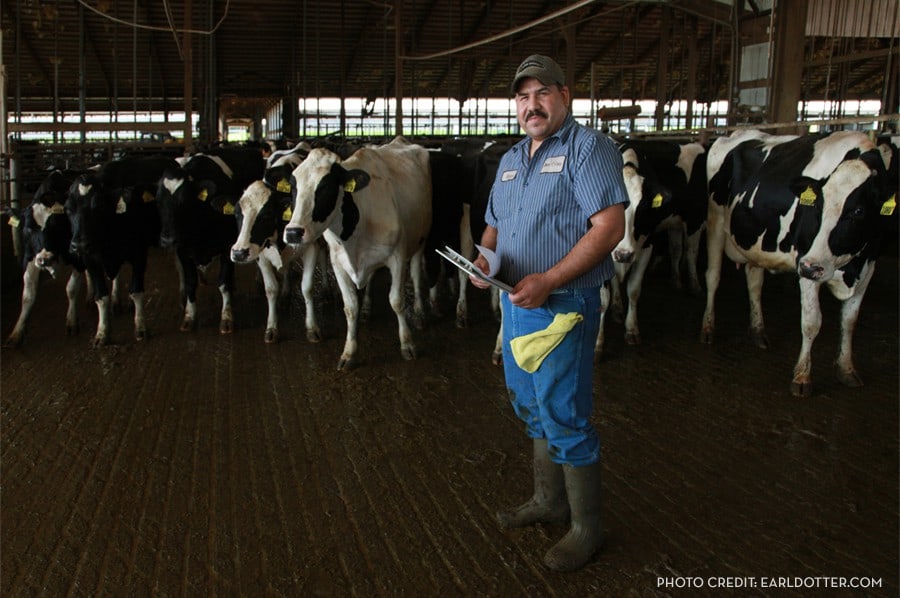
Project Description
As the size and concentration of dairy production increases in Wisconsin, so too does the workforce. With an increasing number of immigrant, Hispanic workers in the Wisconsin dairy industry with unaddressed language barriers and training needs, culturally and linguistically appropriate education in agricultural health and safety is necessary.
The Seguridad en las lecherias project will employ a popular education model that builds on experiential learning approaches relevant to the everyday lives of workers. The goal of this project is to bridge the gap in worker health and safety training in dairy production, by testing a culturally appropriate, occupational safety and health intervention to reduce worksite hazards and to improve knowledge and practices among immigrant dairy workers in Wisconsin.
PROJECT BACKGROUND:
- Immigrant workers are increasingly crucial to dairy farms across the United States. As of 2015, immigrant workers were an estimated 51% of all labor in dairy operations, and on larger operations, they provided 79% of the labor (Adcock et al. 2015). Between 2008 and 2012, an average of 39 people died per year while working with dairy cattle and milk production (Slovak 2012). Interactions with cattle caused most non-fatal injuries and resulted in more time off work than other agricultural injuries. Many immigrant workers do not speak English and may have limited formal education and literacy, presenting challenges to effective safety education. The Seguridad en las Lecherias project implemented a community health worker (CHW) model to train selected workers on health and safety to enable training to other co-workers and put knowledge and training for workplace safety into the hands of the workers themselves.
PROJECT GOALS:
- 1Translate and apply research to an occupational health and safety intervention for immigrant workers in dairy.
- Engage dairy producers, farm managers, workers and clinicians, and health and safety professionals to raise awareness and increase understanding of strategies to improve the occupational health and safety of immigrant workers in the dairy industry.
- Evaluate the intervention to determine the reduction in hazards, changes in knowledge, attitude, and practices among immigrant workers, and the acceptability of the culturally appropriate popular education (CAPE) model.
SPECIFIC AIMS:
- Translate and apply research to an occupational health and safety intervention for immigrant workers in dairy;
- Engage dairy producers, farm managers, workers and clinicians, health and safety professionals to raise awareness and increase understanding of strategies to improve the occupational health and safety of immigrant workers in the dairy industry; and
- Evaluate the intervention to determine reduction in hazards, changes in knowledge, attitude and practices among immigrant workers and the acceptability of the CAPE methods.
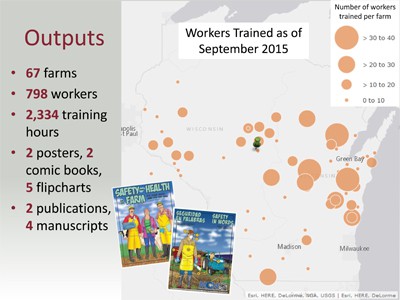 The steady increase in consumer demand for dairy products has led to the increase in size and concentration of dairy operations. These large farms bring new occupational risk factors and changes in the diversity of the workforce. It is now estimated that 60% of the milk supply in the US is produced with assistance from immigrant labor, most of which are Hispanic and makes up half of the dairy workforce. These immigrant workers tend to have limited formal education, no training in handling large animals and speak only Spanish.
The steady increase in consumer demand for dairy products has led to the increase in size and concentration of dairy operations. These large farms bring new occupational risk factors and changes in the diversity of the workforce. It is now estimated that 60% of the milk supply in the US is produced with assistance from immigrant labor, most of which are Hispanic and makes up half of the dairy workforce. These immigrant workers tend to have limited formal education, no training in handling large animals and speak only Spanish.
The Seguridad en las Lecherias (Safety in Dairies) project addresses the needs of this vulnerable workforce by designing and implementing a bilingual health and safety training curriculum that is culturally appropriate for Hispanic workers. The training consists of five 1-hour lessons in Spanish with a ‘train-the-trainer’ approach that prepares selected Hispanic workers to become promotores de salud (community health workers) to allow for ongoing support and reinforcement of safety messages after the training is completed. The Occupational Safety and Health Administration (OSHA) has approved the curriculum. This year, the project team along with colleagues from four other organizations was given the Stakeholder Collaboration in Occupational Injury Research Award by the National Safety Council for their work. The training curriculum materials have also been provided by request to over 30 other organizations across the US to train workers outside of this project.
As of September 2015, the Seguridad project has trained almost 800 workers on 67 farms providing over 2,300 worker training hours. Trainings will be completed this year. Workers who have been trained show a clear increase in health and safety knowledge. Farmers also benefitted in their relationships with their workforce through this training. As one producer wrote in a thank you note, “The information provided during these lessons have been very beneficial to our Spanish-speaking employees because the language barrier often prevents us from the getting the information to our employees accurately or in a timely manner. This has been a very positive experience for all of us.”
In it’s initial phase, the project has reached
3,453 training hours to 850 workers on 68 farms.
Project News
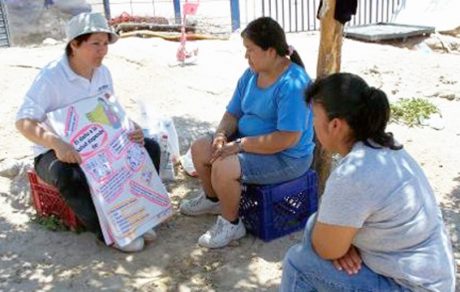
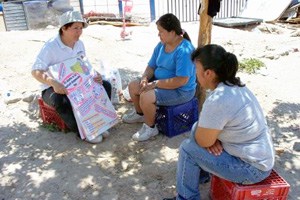
Recognizing One of Our Own – Seguridad en las Lecherías: Immigrant Dairy Worker Health and Safety
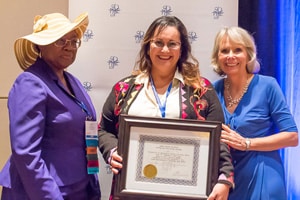
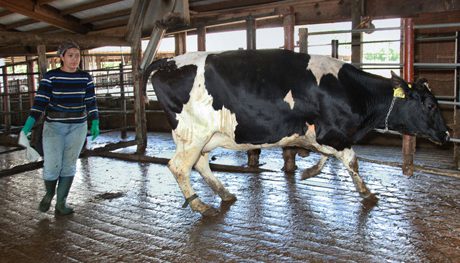
SPOTLIGHT: MCN Publication on Immigrant Dairy Worker Trainings Wins Paper of the Year Award
UMASH and the Migrant Clinician’s Network partnered together to develop, train and deliver the Seguridad en las Lecherías project from 2011 – 2016.
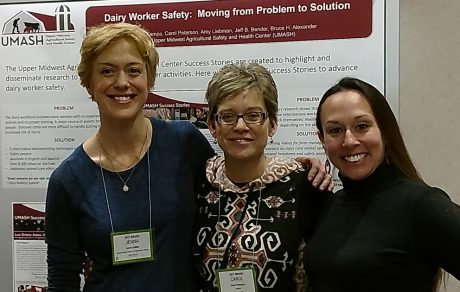
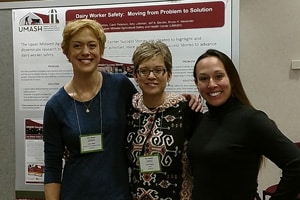
Now Showing…New Horizons in Agricultural Safety and Health
The Midwest Rural Agricultural Safety and Health (MRASH) Conference was held November 14 and 15, 2017 at Central College in Pella, Iowa. Over 70 agricultural
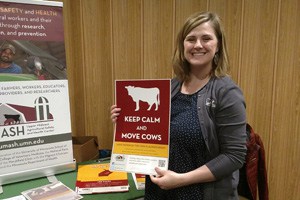
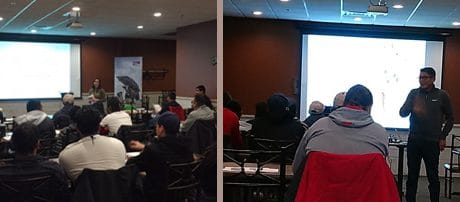
The Cow is Always Right – La Vaca Siempre Tiene La Razon
UMASH was fortunate to cooperate for a second time with Minnesota Milk Producers (MMPA) at a recent Spanish Dairy Management Workshop. 25 dairy workers
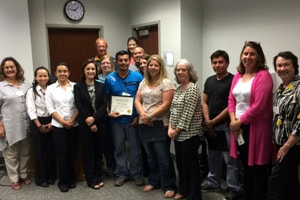
SPOTLIGHT: An Ode to Research Participants
I recently had the privilege to organize an event acknowledging the efforts of participants in our Hispanic worker training research project. We had asked
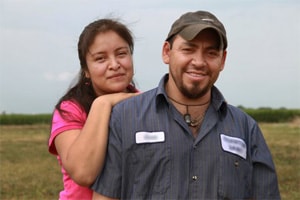
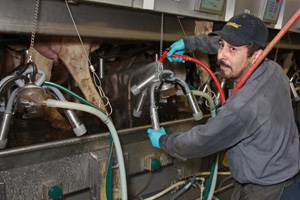
SPOTLIGHT: Seguridad – Translating Research to Practice
OCTOBER 2016 Have you ever changed your behavior because of a research study you came across on the radio or in a magazine? Perhaps you you started an
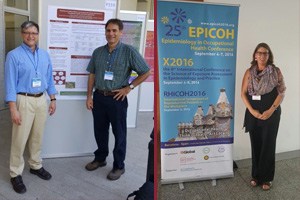
UMASH at EPICOH 2016
Buenas Dias, UMASH! It was a good several days in Barcelona, Spain, September 4-8 when Bruce Alexander, Jeff Bender, and Amy Liebman presented at the 25th
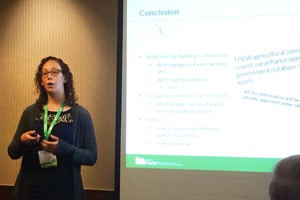
UMASH Researchers at 2016 ISASH Conference
UMASH researchers presented and engaged with other ag safety professionals at the 2016 ISASH conference in Lexington KY June 26-29, 2016. Megan Roberts,

UMASH at 2016 WPHA – WALHDAB Annual Conference
UMASH participated in the 2016 Wisconsin Public Health Association – Wisconsin Association of Local Health Departments and Boards (WPHA – WALHDAB)
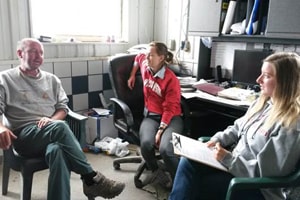
NFMC 2015 Summer Interns
Katherine Ziekle and Elizabeth Steiner were 2015 summer interns with the National Farm Medicine Center (NFMC) at Marshfield Clinic through the Occupational
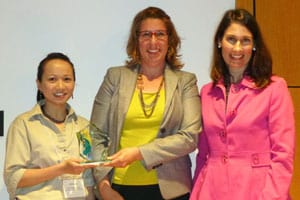
UMASH Partners Receive Research Collaboration Award from National Safety Council
The National Farm Medicine Center (NFMC), Migrant Clinicians Network (MCN), and four partner organizations received the inaugural Stakeholder Collaboration
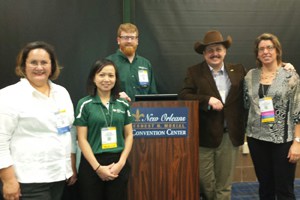
UMASH at 142nd Annual Meeting of APHA
UMASH was represented well at APHA in New Orleans, Louisiana, November 17-19. Healthography was the theme for this 142nd Annual Meeting of the American
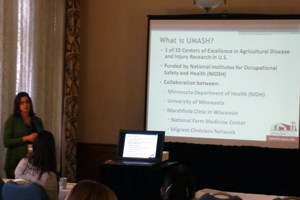
UMASH at 7th International SHARP Symposium
UMASH staff presenting in Saskatoon, SK, Canada, October 19-22, at the 7th International Symposium: Safety & Health in Agricultural & Rural Populations:

National Farm Medicine Center Hosts Two Intern Students
The National Farm Medicine Center hosted two students as part of a national summer internship program providing practical experience in the field of occupational
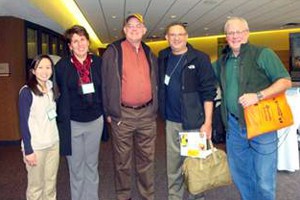
UMASH at the Midwest Rural Agricultural Safety and Health Conference in Iowa
UMASH personnel were well represented at the November 19-20, 2013 Midwest Regional Agricultural Safety and Health Conference (MRASH) – “The Many
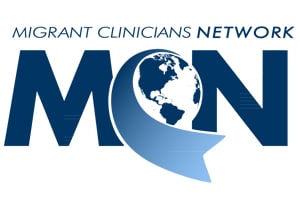
MCN Webinar on Workers and Health
Migrant Clinicians Network’s recent webinar demonstrated the link between the workplace and the health of agricultural workers and their families. More
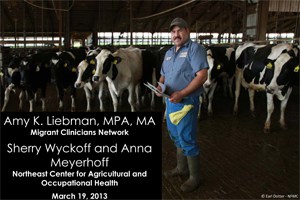
UMASH Presents at the Rural Migrant and Immigrant Health Conference in Pennsylvania
UMASH Seguridad en Las Lecherias: Immigrant Dairy Worker Health and Safety Project Co-Director, Amy Liebman, MPA, MA, presented “Health and Safety


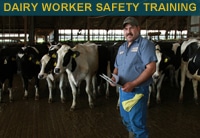 The Seguridad project uses a popular education model that includes worker training and promotores de salud (or Community Health Workers) to reduce worksite hazards and to improve worker knowledge and practices. Through extensive input from workers, health and safety professionals and researchers, this project developed an OSHA-approved five-module, bilingual health and safety training curriculum. The curriculum includes background sections on each topic and a step by step facilitators guide with visuals either in the form a power point slide presentation or a flip chart. Available in English and Spanish
The Seguridad project uses a popular education model that includes worker training and promotores de salud (or Community Health Workers) to reduce worksite hazards and to improve worker knowledge and practices. Through extensive input from workers, health and safety professionals and researchers, this project developed an OSHA-approved five-module, bilingual health and safety training curriculum. The curriculum includes background sections on each topic and a step by step facilitators guide with visuals either in the form a power point slide presentation or a flip chart. Available in English and Spanish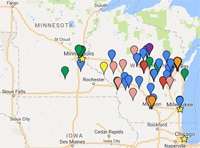 Through the Occupational Health Internship Program (OHIP), the National Farm Medicine Center (NFMC) created an interactive Google map of organizations that provide services to Spanish-speaking residents in Wisconsin and Minnesota. This was a project developed to help the farm workers learn about other services that may be available to them. Available in English and Spanish.
Through the Occupational Health Internship Program (OHIP), the National Farm Medicine Center (NFMC) created an interactive Google map of organizations that provide services to Spanish-speaking residents in Wisconsin and Minnesota. This was a project developed to help the farm workers learn about other services that may be available to them. Available in English and Spanish.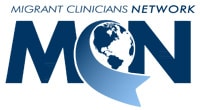 Migrant Clinicians Network is a national organization with over 30 years of experience addressing the health and safety needs of immigrant workers and their families, assisting workers on farms, at construction sites, and in hotels, nail salons, and restaurants. We bring the clinical perspective into the health and safety conversation, with culturally and linguistically appropriate resources, programs, and direct assistance to help clinicians and health centers address the diverse health needs of their communities’ immigrants and migrants. We also aim to improve the health of immigrant workers by bringing health and safety messages directly to them.
Migrant Clinicians Network is a national organization with over 30 years of experience addressing the health and safety needs of immigrant workers and their families, assisting workers on farms, at construction sites, and in hotels, nail salons, and restaurants. We bring the clinical perspective into the health and safety conversation, with culturally and linguistically appropriate resources, programs, and direct assistance to help clinicians and health centers address the diverse health needs of their communities’ immigrants and migrants. We also aim to improve the health of immigrant workers by bringing health and safety messages directly to them.
